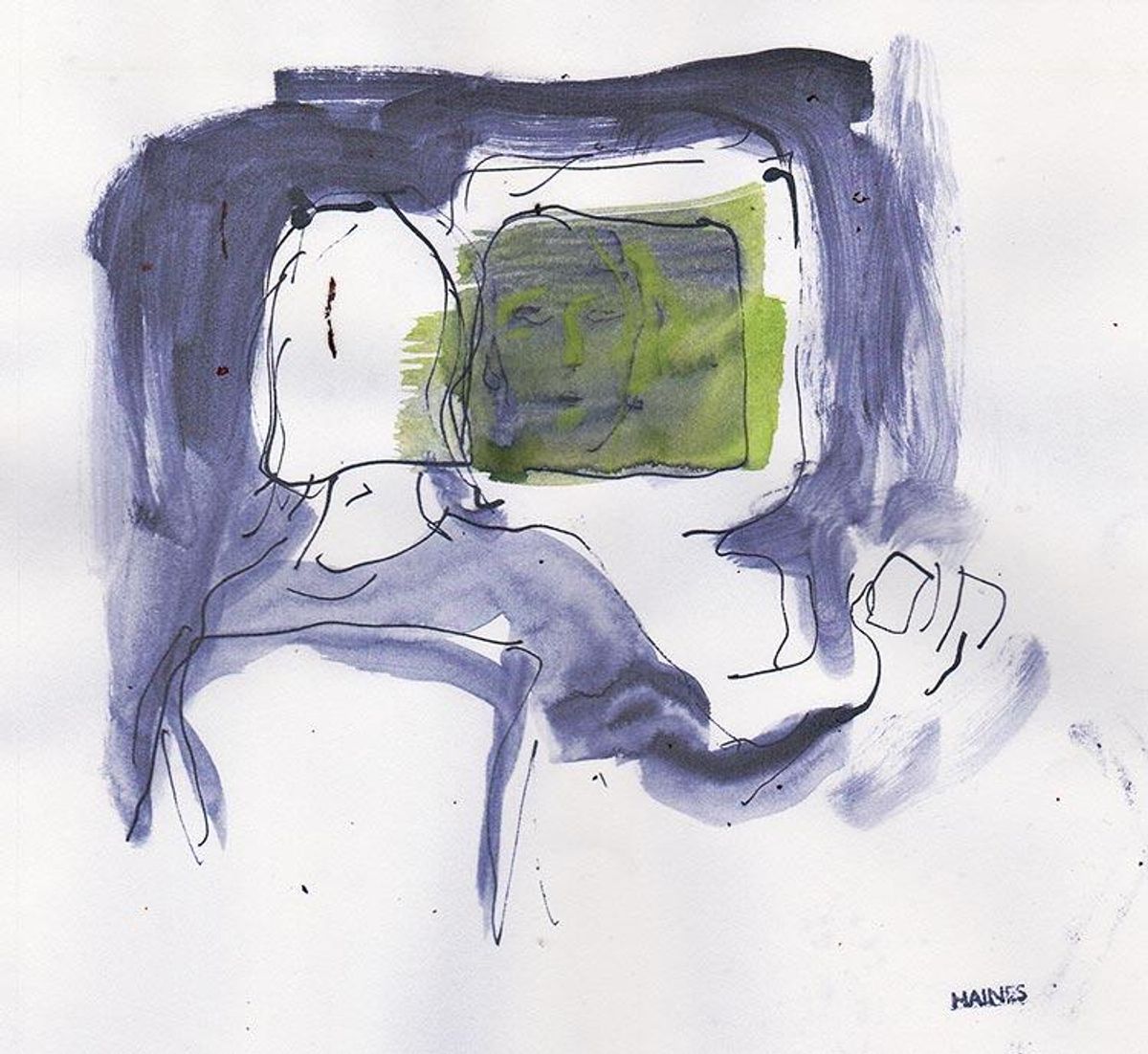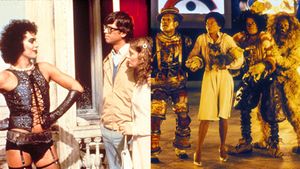We tend not to think of writing as a bodily act. Doesn't writing fiction happen entirely in your head? But that's not true: The physical act of writing a thought down changes everything. The transition from idea to sentence is a rough one, as the multidimensional constellation of a thought gets collapsed and dragged, by hand usually, into a line on a page that is never as good as you hoped. It's a cerebral act, yes, but it only becomes real through the physical act. Which somehow damages it. Writing is also an act of repair.
In writing fiction, you're crafting bodies. You create people and you live in them and you try to shape their minds and physical selves with enough detail that when you hand the piece to someone else, the reader can enter and inhabit bodies and lives wildly different from their own. Or so that you yourself can slip into those bodies and move through lives you wish you knew.
Related | Turning Life into Art, a New Novel Reunites Eleanor Roosevelt with her Lesbian Lover
The first queer scene I ever wrote took place on a rock, next to a noisy river, behind a thick line of trees, on a mountain, in Norway. As if this weren't hidden enough, I typed it on my parents' Apple IIc by hitting return for 80 pages at the end of a dummy document and then writing it way down at the bottom of that darkness. The way the Apple IIc worked was that you had a black screen and white letters and there was no scroll bar, just an up arrow and a down arrow, so you would only ever find this scene if you knew it was there -- and were patient enough to hold down the arrow through endless screens of rippling blackness until the white text flashed into sight. There you would find a tender moment of romance between an unnamed first-person narrator and Wendy, a caramel-haired, husky-voiced, red-lipped girl from Sarasota, Fla., whom I'd befriended at Camp Norway the summer before. I was 17.
I had never kissed a girl in real life, but here, in the darkest back alley of AppleWorks, I got to try it out. I could inhabit a fictional body to access all the things my corporeal body couldn't yet.

Chelsey Johnson's debut novel, Stray City. (Photo courtesy of Custom House/HarperCollins)
Dark spaces have always been good places for queer desire to emerge, alone or with others. Bedrooms, barrooms, parties, parks at night. In the bright light of the family kitchen, we learn to dissemble and demur. Most of us do not have queer identity in common with our parents or siblings--most of us are, or feel, alone in the family. We are secret agents. We know something they don't. We learn to split ourselves, lead two lives.
But as difficult as it is, even crushing, maintaining a secret self trains you in the arts of fiction--you learn to observe keenly and listen closely as a matter of survival. You learn to think three steps ahead in conversation, tailor your dialogue--to steer the family bus away from the neighborhood of your real desires and fears well before anyone can even catch a glimpse of them. You craft a persona, develop a character. You hone the art of subtext.
Related | Artist Agnes Martin Faced Shock Treatments & Stigma in Her Search For Love
The computer where I typed my first stories sat in a corner of the basement family room. I had to look over my shoulder when I wrote, and I stored my floppy disks in my dresser drawer, away from my family's curious eyes.
Now, I and almost everyone else carry our own private screens with us everywhere. We make ourselves legible on these screens, disseminating observations, usually brief, and pictures, often filtered. Because the screen shows us so much, it's easy to mistake it for a window. We walk with heads bowed reverently, index fingers stroking a slice of glass, staring at the tiny still faces and landscapes in our hands, while live humans walk around us and century-old trees rustle leaves overhead. We look at Facebook instead of faces. We check the weather app instead of the sky. Paradoxically, in the most visually obsessed culture of all time it is easy to forget the art of looking. Or, to lower the bar, not just the art, but even the dumb bored unconscious practice of it.
Queer connection was built upon and has survived on the art of looking, of reading bodies. A scanning glance, testing, confirming. The look of recognition, a subtle acknowledgment between strangers that leads nowhere and means nothing more than "me too," which can mean the world. The secret smile exchanged as you pass on the street. The hanky code, especially before the internet, when the only way to decode it was to know someone who knew. The book purchase. Which bar to go to.
The screen simplifies this search, but it atrophies the very skills that are good for writing. The screen is irresistible with its bright promise of company and community, loneliness relieved. But writing requires both dark space and live people. You need to lurk in your head, and you need to keep an eye on the world around you. You need to read faces and bodies. You need to write into a void, with the impulse to fill it.

Author Chelsey Johnson.
I don't want to sound like a Luddite. I'm as tied to my screen as anyone. It is impossible to overstate how meaningful it is to find such an explosion of representation where previously we could access so little. But for all the real benefits of our online connections, I still think our peril and our power are sourced most potently in our bodies--in which bodies matter, which bodies are legislated, protected, banned, prosecuted, sanctified. In protest, in art, and in life it's in the gathering and congregation of our bodies that we draw power from each other, that we push back and we recreate. We put our bodies on the line. We make a scene.
The word scene derives from the Latin and Greek for stage. The stage is a space that is both public and separate, visible yet removed--and this is vital to how queer scenes operate.
The scene is a staging ground. A scene in this sense--a queer scene, a music scene, a ballroom scene, etc.--takes shape in recurring appearances: It is constituted by who shows up again and again. A sensibility emerges from the repetition and revision of a shared aesthetic and physical presence.
Though queer culture is born out of subtext, equally important is how queer life historically and today depends on the overt, on performance. Embodied in drag, camp, parades, nightlife, and art, the degraded body is made magnificent, the abject self transmuted into something divine, epic, heroic. Let's not mistake the image for the scene. "Pictures or it didn't happen" captures the anxiety of representation that, for the historically underrepresented, has a ring of existential truth. But the scene, though it may appear to be constituted in photographs, has always relied on who is present in public or semipublic gatherings, as well as what happens offscreen, behind the scenes, not visible to the outside.
That first queer scene I wrote is long gone--I never transferred it or printed it before the Apple IIc went the way of the dodo. My scene only lives, or died, on its 3 1/2-inch floppy disk, now obsolete. Writing that scene was the first time I made my queer possibility legible. It was in writing it that I realized I wanted it. I made mistakes. I had to learn how to live the life in order to write about it, but I also had to write about it in order to prepare myself to live in it. On that dark screen was a stage I could clumsily step onto, a space where I could create alternate bodies to live in while I prepared to fully inhabit my own.
Chelsey Johnson is a former editor of OUT. Her debut novel, Stray City (Custom House/HarperCollins), is available now.


























































































